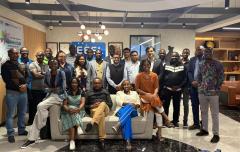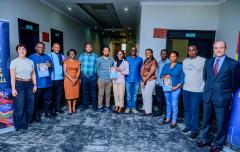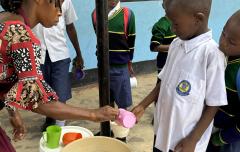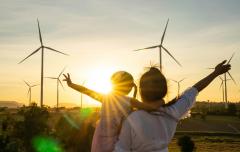Powering ASEAN’s Journey to a Just and Equitable Energy Transition
Southeast Asia is at a pivotal point in its energy transition. Rapid economic growth and rising energy demand mean the region’s choices will shape global climate outcomes. While each country faces distinct challenges, their energy systems are closely linked—making a coordinated regional approach essential to ensure a secure, affordable, and sustainable future.
From 28 to 31 July 2025, Sustainable Energy for All (SEforALL), in collaboration with the ASEAN Centre for Energy and with support from the ASEAN-UK Green Transition Fund, hosted the ASEAN Regional Capacity Building Workshop on Energy Transition and Investment Planning in Bangkok, Thailand. The event brought together 30 participants from 7 ASEAN Member States — Indonesia, Lao PDR, Malaysia, Myanmar, the Philippines, Thailand, and Viet Nam — as well as Timor-Leste, alongside 8 development agencies, to strengthen capacity in energy transition modelling, scenario planning, and investment pathway formulation.
A Regional Approach to Clean Energy Planning
This inaugural workshop forms part of the ASEAN Energy Transition and Investment for Green Value Chains initiative, designed to support the creation of an integrated ASEAN Energy Transition and Investment Roadmap, that SEforALL is helping to develop. The roadmap will play a pivotal role in delivering the upcoming ASEAN Plan of Action for Energy Cooperation 2026–2030, advancing the ASEAN Carbon Neutrality Strategy, and informing the ASEAN Energy Outlook 9.
“A comprehensive planning approach with robust tools, skills, and institutions is critical for the ASEAN region to mobilize clean energy investments to achieve common goals for development and climate.”– Alvin Jose, Head of Energy Transition and Energy Efficiency, SEforALL
Hands-On Learning with Practical Tools
Over the course of four days, participants gained hands-on experience with SEforALL Energy Systems Model (SEM), applying national contexts of the energy sector to explore tailored energy transition pathways. Guided by case studies, they learned how to set up key variables in SEM and interpret results for decision-making.
Highlights of the workshop included technical deep dives into power, transport, industry, buildings, and agriculture, alongside introductions to complementary tools such as energy access planning platforms, energy demand forecasting models, carbon sequestration models, and multi-criteria analysis frameworks, equipping participants with a well-rounded toolkit for integrated energy transition planning.
"The workshop was very insightful and informative. We gained a new perspective on energy transition and learned to view it in a more holistic way. It also provided valuable insights into possible policy recommendations for the Philippines. Grateful to SEforALL for its efforts in advancing net-zero and for organizing this meaningful workshop."— Charlene Gem Farro, Department of Energy, Philippines
South-South Exchange and Collaboration
Collaboration was a defining feature of the workshop. Country presentations revealed national priorities, modelling capabilities, and ongoing policy initiatives, enabling participants to identify both common challenges and opportunities for coordinated action.
Development partners, including UNEP, UNESCAP, UNIDO, UNOPS and the Asian Development Bank shared their work in the region, helping participants connect modelling outcomes to real-world implementation.
"The workshop in Bangkok has been such a great learning experience. We spent four full days digging into energy modelling and planning tools, and honestly, it’s made the energy transition feel a lot more real and doable. Everyone was open to share, ask questions, and work together. Super grateful to be part of this journey." — Dr. Fitria Astuti Firman, Energy and Mineral Resources and the National Energy Council, Indonesia
Key Outcomes
A key outcome of the workshop was the validation of country-specific datasets and assumptions that will underpin the ASEAN Energy Transition and Investment Roadmap (ETIR). In addition, the workshop introduced the ASEAN ETIR modelling framework and methodology to the participants from ASEAN member states for their review and comments.
Through individual country consultations, participants refined inputs to ensure the roadmap reflects both regional consistency and national contexts. These contributions were essential as the regional roadmap cannot be actionable without reflecting the realities and perspectives of each Member State.
Having countries directly shape the inputs strengthens alignment with domestic and regional policies to guide and attract investments to achieve ASEAN’s carbon neutrality goals. The workshop concluded with agreement on next steps to establish a process for validating country outputs and regional scenario development.
Looking Ahead
This workshop was just the beginning. Building on the momentum from Bangkok, the programme will focus on transforming the data, insights, and collaboration established here into a reliable, actionable Energy Transition and Investment Roadmap for ASEAN.
Once in place, this roadmap will serve as a powerful tool for unlocking investment opportunities and delivering on climate commitments while safeguarding energy security and supporting sustainable economic growth.
SEforALL extends its gratitude to all participants for their commitment and contributions. Together, we are turning shared ambition into concrete action, laying the groundwork for a sustainable and secure energy future for Southeast Asia.



